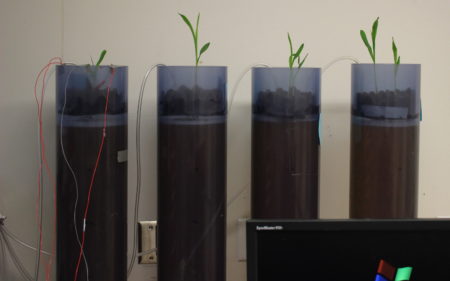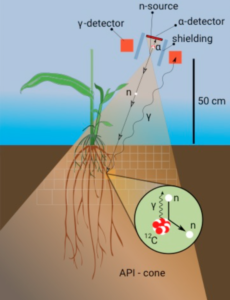 EcoSENSE is an effort to organize capabilities around developing sensor networks for the environment. EcoSENSE is aligned with several of Berkeley Lab’s projects as well as the labwide Microbes-to-Biomes initiative, a cross-Area collaboration between Earth and Environmental Sciences and Biosciences. The aspiration of EcoSENSE is to develop an entire ecosystem sensing package to monitor the impacts of climate and weather on ecosystem function. This is facilitated by the co-location of scientific expertise—in soil biology, soil physics, soil chemistry, geophysics, nuclear physics—all in one location at Berkeley Lab.
EcoSENSE is an effort to organize capabilities around developing sensor networks for the environment. EcoSENSE is aligned with several of Berkeley Lab’s projects as well as the labwide Microbes-to-Biomes initiative, a cross-Area collaboration between Earth and Environmental Sciences and Biosciences. The aspiration of EcoSENSE is to develop an entire ecosystem sensing package to monitor the impacts of climate and weather on ecosystem function. This is facilitated by the co-location of scientific expertise—in soil biology, soil physics, soil chemistry, geophysics, nuclear physics—all in one location at Berkeley Lab.
EcoSENSE will develop and deploy advanced field sensors to quantify the interactions between key environmental constraints and biological function within the biomes of interest. Key to this effort will be development of remote autonomous sensing networks that function across scales, linking laboratory and field experiments. Two Berkeley Lab projects have recently been funded which address key problems related to EcoSENSE’s goals. The projects, funded at $2.3M each under the DOE ARPA-E ROOTS program, seek to develop technologies capable of non-destructive, high-throughput quantification of soil and root properties. The two projects are summarized below:
Integrated Imaging and Modeling Toolbox for Accelerated Development of Root-Focused Crops at Field Scales
PI: Yuxin Wu, Climate & Ecosystem Sciences Division
In this project, the team will develop an electrical impedance-based sensor technique that uses electrical currents to determine the properties of root systems in the field. The team will incorporate electrodes into plants and soils, then employ advanced algorithms to derive phenotypic information from the sensor data. This data will be integrated with ecosystem models to identify relationships between plant genotype and phenotype. Initially, the technology will be applied to wheat breeding programs at field sites in Oklahoma, with possible future applications.
Key collaborators include the Oklahoma-based Samuel Roberts Noble Foundation, the largest independent agricultural research institute in the U.S. with more than 13,500 acres of farmland carrying out research to enable farmers and ranchers to increase regional productivity and land stewardship; and Subsurface Insights, a small business geophysical research and development company headquartered in Hanover, NH that specializes in developing, enhancing, commercializing and applying software and hardware for semi-autonomous geophysical and geological data acquisition, processing and result delivery.
Associated Particle Imaging (API) for Non-Invasive Determination of Carbon Distribution in Soil
PI: Arun Persuad, Accelerator Technology & Applied Physics Division
This project will develop a tool to precisely quantify soil carbon distribution using inelastic neutron scattering. This is a major advance over existing methods because it does not require samples to be extracted and analyzed chemically. The project takes advantage of recent technical breakthroughs in compact neutron generators, using these particles to form an image of the spatial distribution of carbon and other elements in the soil to depths of 30 cm. If successful, this tool will enable measurement of changes in soil carbon stocks over time, allowing step change improvement in the evaluation and adoption of better land management practices or selection of enhanced crop cultivars.
Key collaborators include Adelphi Technology, Inc. based in Redwood City, CA who specialize in the development of neutron generators.


